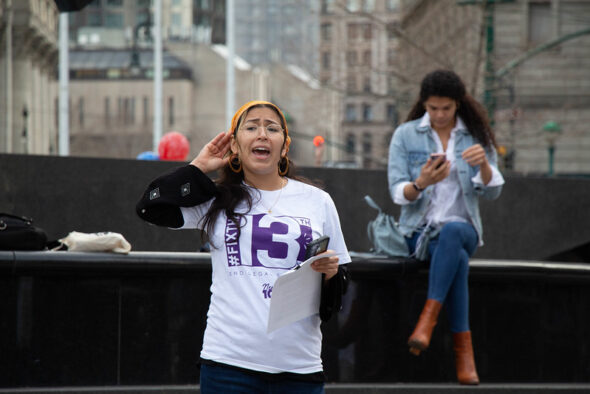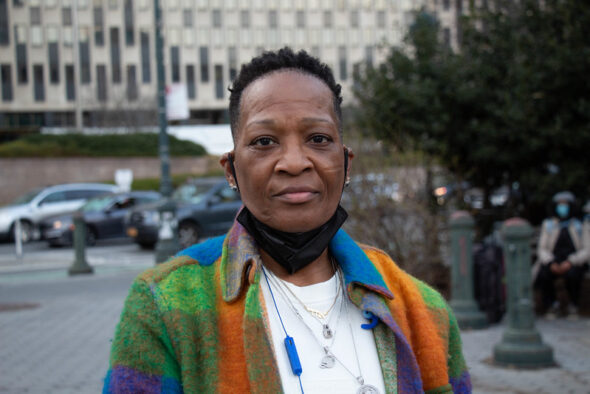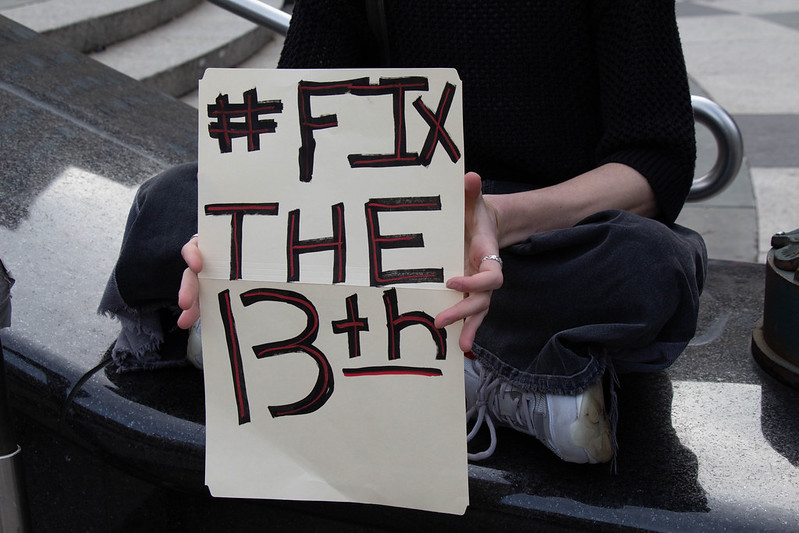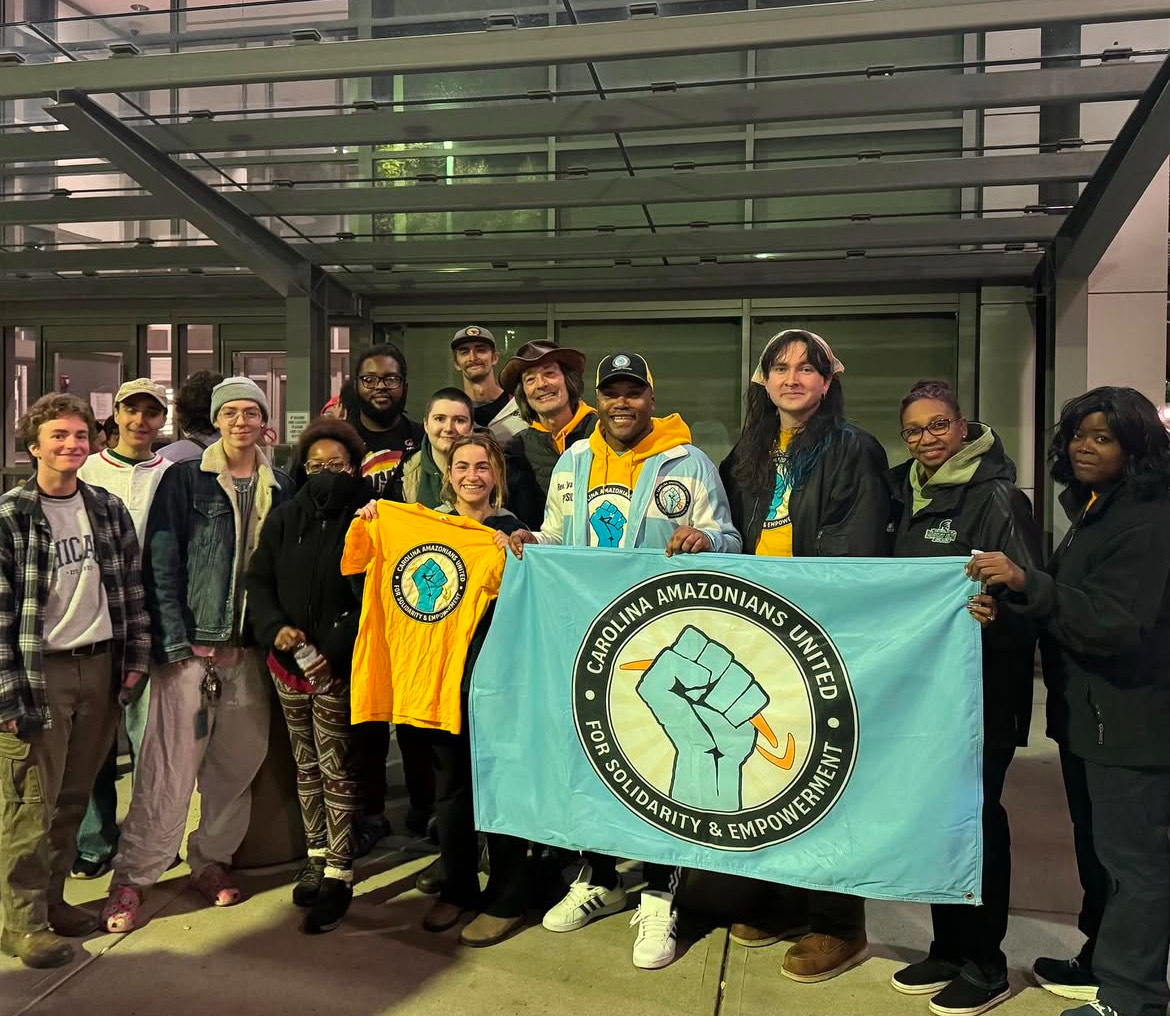In New York State, incarcerated workers have a starting salary of 16 cents per hour. That wage can be increased to 65 cents per hour, while the minimum wage for non-incarcerated workers in New York is $12.50.
Fed up advocates and directly impacted folks gathered in Foley Square yesterday for an “End Convict Leasing 2.0 Rally” to raise the alarm about what they call a reintroduction of “legal slavery” into New York state prisons within Governor Hochul’s “Jails to Jobs” proposal.
“Jails to jobs sounds good, but bringing back forced labor isn’t even the worst part,” said Grace Ortez of #FixThe13thNY, who organized the rally.

Grace Ortez leads a chant at the Foley Square rally: “What do we want? Fix the 13th! When do we want it? Now!” Annie Iezzi, 3/15/22.
The plan aims to improve re-entry into the workforce and reduce re-entry into the prison system for the formerly incarcerated, but one facet is allowing private companies to contract imprisoned workers, a practice that has been outlawed in New York since the 1890s.
“Corporations already making money through exploitation will be making even more on the backs of the oppressed. On top of that, the state could take up to 50% of those wages away,” Ortez said.
One stipulation of the proposal is up to 50% wage garnishment, a process by which the state can collect a percentage of the pay of incarcerated workers for costs like taxes and child support.

Audrey Johnson, a formerly incarcerated woman, calls prison labor slavery at the #FixThe13th rally. Annie Iezzi, 3/15/22
“Out here, there’s a lot of jobless people. In there, we’re being used,” said Audrey Johnson, a formerly incarcerated woman, in response to the budget proposal.
She said that instead of guaranteeing competitive wages inside the prisons, the amendment would reduce the competition of outside jobs with cheap prison labor.
“It is slavery,” Johnson said. “You’re getting 10 cents an hour, and it takes jobs away out here. If private companies can have prisoners make products, they aren’t going to pay minimum wage out here.”
New York State residents use a wide range of products made by imprisoned workers. From car license plates to surgical masks, incarcerated people in NY generate a $50 million manufacturing economy for the state each year.
Shear Avory, an advocate with New Pride Agenda, pointed out that incarcerated workers have been essential during the COVID-19 pandemic.
“[They] are workers that provide this state with the essentials,” Avory yelled, looking up at the courthouses surrounding Foley Square. “Where were your masks coming from New York? Where was your hand sanitizer coming from New York? We talk about valuing our essential workers, so we need to value prison labor,” Avory said.
In the final section of the 2023 Fiscal Year State Budget, Governor Hochul proposed a constitutional amendment to, “allow employment [of imprisoned workers] by private entities”. Hochul’s office emphasizes the skill-building potential of the program, calling it a, “public-private partnership that would enable hybrid work-release programs within prisons.”
“These partnerships, which would be voluntary and pay a competitive wage, would provide critical private sector job skills to incarcerated individuals,” Hochul’s office said in an online press release.
But incarcerated people and advocates are skeptical of all parts of that statement. Vidal Guzman, who served four years between the Greene and Riverview Correctional Facilities in New York, said that he was, “coerced and forced in labor and vocation,” during his time in prison. Guzman worked as both a mason and a porter there, even though he repeatedly expressed his interest in vocational training in computer technology. He said that when he told a Correctional Officer that he would prefer computer work to masonry training, the officer threatened him with solitary confinement.
“I survived legal slavery,” said Guzman, saying that the work one does in prison isn’t voluntary.
The exact value of imprisoned people’s labor, their wages, will be proposed before the April 1 deadline to set the state’s budget this year. If approved, the state legislature would have to greenlight the same amendment in the budget a second time next year. Then, New York State voters would have the final say on the constitutional amendment to allow private companies to contract labor in prisons.
At the rally, Avory referenced New York’s long history of protest and organizing for fair wages and working conditions, invoking the Triangle Shirtwaist Factory Fire and women’s history month to frame private prison labor as a return to a dark chapter of the state’s history.
“We cannot let companies treat prisons like sweatshops,” said Avory. “It is ridiculous that the most progressive state in our nation, with a woman at the helm, would take such a huge step backwards.”


